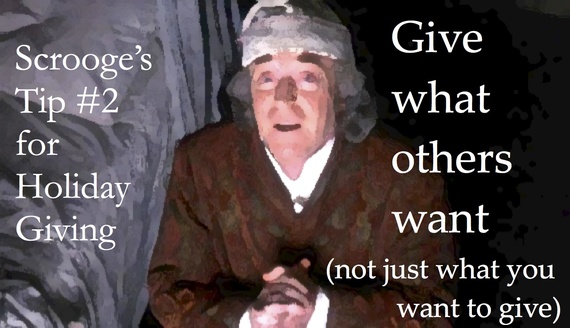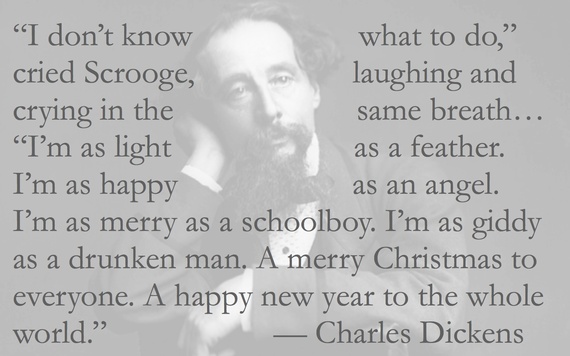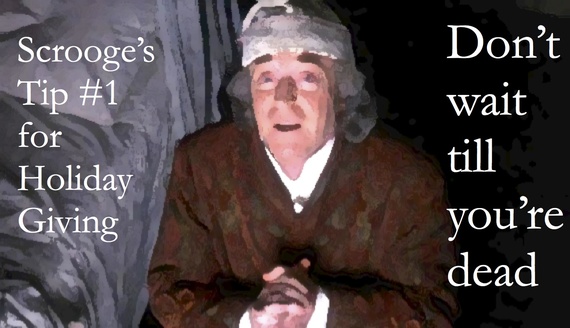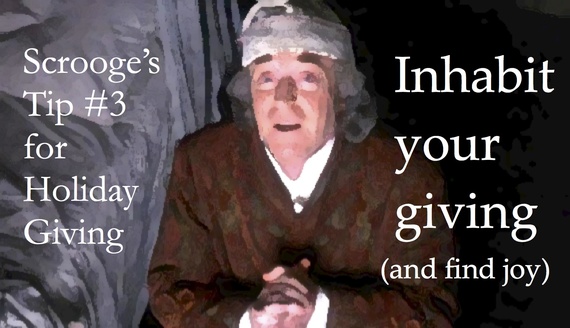Christmas giving can be a burden. It can also liberate us. We can stress over presents and donations, or... we can follow the example of Ebenezer Scrooge.
Dictionaries define a "scrooge" as a miserly person, a skinflint. Yet the main character of Dickens' classic book A Christmas Carol stands out as my favorite literary philanthropist.
When Scrooge casts off his mean and greedy persona, he embraces giving and turns his constrained life into a celebration.
Scrooge's personal transformation comes after visits by four spirit guides, including his former business partner Jacob Marley and the Ghosts of Christmas Past, Present and Future. They help deliver a profound epiphany in which Scrooge sees himself for the first time as he is -- miserable, friendless and missing out on obvious opportunities to create and share happiness.
However, this stark truth leaves room for hope: Scrooge experiences regret while he still has time to take action to address it. And so his soul-shaking revelation becomes a potent -- and joyous -- motivation for change.
We can find a similar motivation, too, if we take a few minutes and imagine we are giving our own eulogy.
It's not hard. Ask these questions:
- What is the meaning of your life?
What do you care about most? What haven't you done that you wish you had done? The answers can open our eyes and allow us to address our regrets and our dreams while we still have time.

Scrooge doesn't over-think his giving or let ego take over the gift selection process. On Christmas, he orders the prize turkey for the under-nourished Cratchit family, promises a donation to the fund for the poor (that he previously shunned) and visits his jovial nephew Fred to share Christmas dinner (he had spurned the invitation earlier).
In 2014, re-gifting is a nifty way to get rid of things you don't like -- but it doesn't deliver the fun of giving what someone -- or some worthy organization -- really could use.
Research helps here. The key takeaway:
Ask others what they want or need.
A Christmas surprise is nice, but Christmas satisfaction is nicer.
Scrooge personifies the benevolent circle that comes with heart-driven giving:
If we are grateful, we will want to give. And if we give, we will feel grateful (and happy).
Scrooge wakes up on Christmas morning extremely thankful just to be alive. He quickly goes into action, opening his window and calling to a boy to go buy the turkey for the Crachit family. His gratefulness drives his behavior. He exclaims: "I will live in the Past, Present, Future. The Spirits of all three will strive in me. Oh, Jacob Marley! Heaven and Christmas Time be praised for this..."
Scrooge's giving also helps amplify his feeling of good will and connection to his community. He blesses others with his generosity and feels blessed to have the opportunity to give.
Dickens tells us that the former miser offers his employee Bob Crachit a raise and becomes "a second father" to Cratchit's son Tiny Tim.
[Scrooge] became as good a friend, as good a master, and as good a man, as the good old city knew ... Some people laughed to see the alteration in him, but he let them laugh and little heeded them ... His own heart laughed: and that was quite enough for him.
So how can we be more like Scrooge? How can we find that kind of bulletproof joy and generosity?
I believe the best route is through an open heart and an inquiring mind. So why not ask ourselves:
- Is giving a duty or a privilege?
If it's a duty, think about why -- do we give seeking approval from the recipient? From peers or friends? From the community or society at large? How could we change our approach to giving to tap into motivations deep within us? What we learn could lead us to a kind of boisterous bliss -- as it did old Ebenezer Scrooge when he said:
I'm as light as a feather. I'm as happy as an angel. I'm as merry as a schoolboy. I'm as giddy as a drunken man. A merry Christmas to everyone. A happy new year to the whole world. Hallo there! Whoop! Hallo!
Our 2024 Coverage Needs You
It's Another Trump-Biden Showdown — And We Need Your Help
The Future Of Democracy Is At Stake
Our 2024 Coverage Needs You
Your Loyalty Means The World To Us
As Americans head to the polls in 2024, the very future of our country is at stake. At HuffPost, we believe that a free press is critical to creating well-informed voters. That's why our journalism is free for everyone, even though other newsrooms retreat behind expensive paywalls.
Our journalists will continue to cover the twists and turns during this historic presidential election. With your help, we'll bring you hard-hitting investigations, well-researched analysis and timely takes you can't find elsewhere. Reporting in this current political climate is a responsibility we do not take lightly, and we thank you for your support.
Contribute as little as $2 to keep our news free for all.
Can't afford to donate? Support HuffPost by creating a free account and log in while you read.
The 2024 election is heating up, and women's rights, health care, voting rights, and the very future of democracy are all at stake. Donald Trump will face Joe Biden in the most consequential vote of our time. And HuffPost will be there, covering every twist and turn. America's future hangs in the balance. Would you consider contributing to support our journalism and keep it free for all during this critical season?
HuffPost believes news should be accessible to everyone, regardless of their ability to pay for it. We rely on readers like you to help fund our work. Any contribution you can make — even as little as $2 — goes directly toward supporting the impactful journalism that we will continue to produce this year. Thank you for being part of our story.
Can't afford to donate? Support HuffPost by creating a free account and log in while you read.
It's official: Donald Trump will face Joe Biden this fall in the presidential election. As we face the most consequential presidential election of our time, HuffPost is committed to bringing you up-to-date, accurate news about the 2024 race. While other outlets have retreated behind paywalls, you can trust our news will stay free.
But we can't do it without your help. Reader funding is one of the key ways we support our newsroom. Would you consider making a donation to help fund our news during this critical time? Your contributions are vital to supporting a free press.
Contribute as little as $2 to keep our journalism free and accessible to all.
Can't afford to donate? Support HuffPost by creating a free account and log in while you read.
As Americans head to the polls in 2024, the very future of our country is at stake. At HuffPost, we believe that a free press is critical to creating well-informed voters. That's why our journalism is free for everyone, even though other newsrooms retreat behind expensive paywalls.
Our journalists will continue to cover the twists and turns during this historic presidential election. With your help, we'll bring you hard-hitting investigations, well-researched analysis and timely takes you can't find elsewhere. Reporting in this current political climate is a responsibility we do not take lightly, and we thank you for your support.
Contribute as little as $2 to keep our news free for all.
Can't afford to donate? Support HuffPost by creating a free account and log in while you read.
Dear HuffPost Reader
Thank you for your past contribution to HuffPost. We are sincerely grateful for readers like you who help us ensure that we can keep our journalism free for everyone.
The stakes are high this year, and our 2024 coverage could use continued support. Would you consider becoming a regular HuffPost contributor?
Dear HuffPost Reader
Thank you for your past contribution to HuffPost. We are sincerely grateful for readers like you who help us ensure that we can keep our journalism free for everyone.
The stakes are high this year, and our 2024 coverage could use continued support. If circumstances have changed since you last contributed, we hope you'll consider contributing to HuffPost once more.
Already contributed? Log in to hide these messages.



